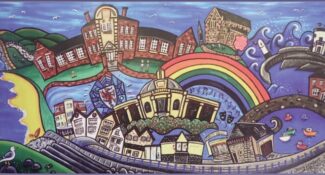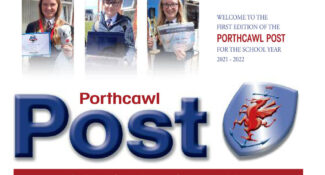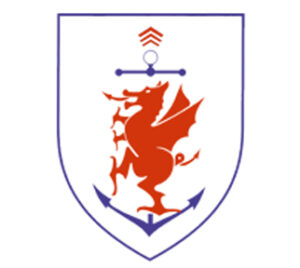Art
Mr R Pettit
For up to date information on KS4 and 5 courses, please see the Options Booklets
-
Key Stage 3
Year 7
Project 1
Learners will explore a sense of identity and belonging through the lens of African tribal cultures.
Pupils are introduced to the concept of Expressive Arts through an introductory task which introduces the ideas of communicating through non-verbal means i.e. signs and symbols.
In Art, pupils will design and make a ceramic tile piece which is inspired by African symbols which relate to learners’ sense of belonging/identity.
This will lead to a project where they will be be manipulating some of the patterns explored in the previous task, to create repeat sequences which can be transferred to fabric.
Skills: Pattern, Colour, Ceramic Work, Responding to the work of practitioners.
Concepts: Formal Elements, Creative Independence, Investigation, Analysis, Evaluation.
Project 2
Learners will explore ‘What it means to be Welsh’ and strengthen their appreciation for Welsh traditions culminating in a celebration of pupil’s work at the annual school Eisteddfod.
In Art, the focus will be on investigating and interpreting stories from the Mabinogi to produce illustrations. This will combine imaginative responses and elements of observational drawing.
Skills: Observational Drawing, Imaginative Composition, Storytelling Skills, Communication Skills.
Concepts: Formal Elements, Creative Independence, Investigation, Analysis, Evaluation.
Project 3
Learners will explore the concept of ‘Discovery’ and make links to historical facts and geographical features.
In Art, learners will investigate historical information relating to Darwin’s journey aboard ‘The Beagle’, with a particular focus on the discoveries in and around the Galapagos Islands. Learners will develop journal presentations, exploring communication of ideas through maps, illustrations and Land art within the local environment.
Skills: Observational Drawing, Imaginative responses, Communication Skills.
Concepts: Formal Elements, Creative Independence, Investigation, Analysis, Evaluation.
Year 8
Term 1
Exploring 60s:
Explore the culture and art of this important decade, responding to the work of Bridget Riley and starting to develop individual design concepts. Build on this knowledge to experiment with logo design ideas; collaborate with peers to develop a ‘virtual’ band and explore how this brand could be developed.
Learners make explicit links to the music and culture of this highly inspirational era.
Skills: Imaginative Composition, Communication Skills, Collaborative Working, Responding to the work of practitioners.
Concepts: Formal Elements, Creative Independence, Investigation, Analysis, Evaluation.
Term 2
Creative Graphic Design:
Experiment with concepts relating to the process of storyboarding, making links to Music videos and taking inspiration from alternative ways of presenting information in a totally visual form eg silent films. Respond to the work of Pop artists, exploring the work of Lichtenstein and experimenting with individual work in this style and make links to the work of contemporary illustrators, such as Frank Quitely.
Skills: Imaginative Composition, Communication Skills, Responding to the work of practitioners.
Concepts: Formal Elements, Creative Independence, Investigation, Analysis, Evaluation.
Term 3
Mythical Creatures:
Explore myths and legends to develop an understanding of the characteristics of Mythical creatures and experiment with drawing techniques, digital media and collaborative activities to create individual outcomes in response to a range of stimuli. Consolidate on work created during the preparatory phase to create increasingly sophisticated responses in a range of media, such as frottage, print-making and clay.
Skills: Observational Drawing, Imaginative Responses, Communication Skills.
Concepts: Formal Elements, Creative Independence, Investigation, Analysis, Evaluation.
Year 9 – All tasks are designed to provide a solid foundation for the skills and content of the GCSE Art & Design course.
Term 1
Painting/Stencil Printing
Develop technical painting skills to create positive and negative portraits using half-tone methods, making links to the principles of Chiaroscuro.
Explore the work of contemporary artists such as Banksy and experiment with basic stencil cutting to replicate the style and develop ‘tags’ to reflect personal Identity.
Skills: Imaginative Responses, Communication Skills, Responding to the work of practitioners.
Concepts: Formal Elements, Creative Independence, Investigation, Analysis, Evaluation.
Term 2
Graphic Illustration; Identity
Investigate the work of Grayson Perry and Gareth Fuller and compile a study of the local environment, via drawing, research and digital images in response to the artistic stimuli.
Create a personal ‘Map of Days’ to reflect aspects of individual identity, experimenting with graphic drawing styles.
Skills: Imaginative Responses, Observational Drawing, Communication Skills, Responding to the work of practitioners.
Concepts: Formal Elements, Creative Independence, Investigation, Analysis, Evaluation.
Term 3
Exploring Pattern & Colour
Investigate the work of Hundertwasser, exploring the immediate environment to generate outcomes in the style of the artist.
Create paintings, combining pattern and colour to further develop painting skills and develop understanding of colour theory.
Skills: Imaginative Composition, Communication Skills, Responding to the work of practitioners.
Concepts: Formal Elements, Creative Independence, Investigation, Analysis, Evaluation.
Ways in which parents can help:
- Ensure that pupils come to Art lessons with appropriate equipment- pencils, pens, eraser, sharpener.
- Encourage learners to take an interest in their immediate environment and develop curiosity.
- Support pupils with homework tasks.
- If possible, ensure that pupils have access to a variety of materials at home, such as colouring pencils, glue, etc.
- Try to experience works of art first hand, with trips to galleries/museums.
- Useful websites:
- National Museum of Wales Website
- Tate Modern/Tate Britain/Tate St Ives
- Useful books/magazines/publications:
- The 20th Century Art Book.
- Ways of Seeing, By John Berger.
- The Story of Art – Gombrich




